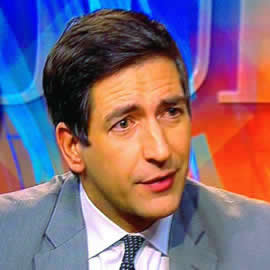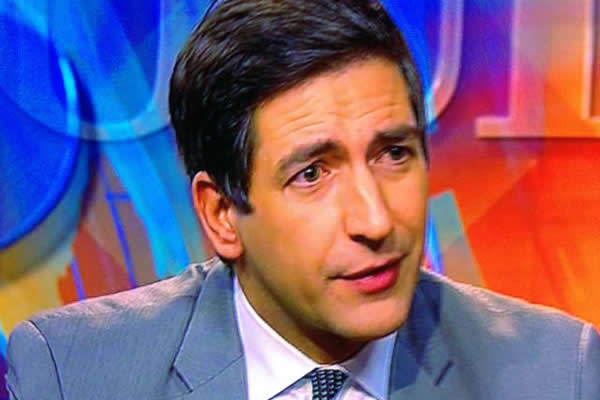National
Gay advocate a leading voice on gun control
Glaze serves as director of Mayors Against Illegal Guns

Following a wave of horrific gun violence across the country, the nation is engaged in intense debate over gun control as President Obama on Wednesday issued a series of proposals to address the issue. One advocate who’s no stranger to working on behalf of the LGBT community is among those leading the call for action on gun control.
Mark Glaze, 42, has a variety of issues in his portfolio as a principal of the D.C.-based political affairs firm the Raben Group, including campaign finance reform, government ethics as well as LGBT issues — but also serves as director of Mayors Against Illegal Guns, the largest gun violence prevention group in the country.
In an interview with the Washington Blade, Glaze, who’s gay, said the country is “at a tipping point” in the wake of shootings like the one last month at Sandy Hook Elementary School in Newtown, Conn., where 20 children and six school officials were killed, and is ready to embrace the kinds of protections that “we get the chance to pass once in a generation.”
“The mass shootings are happening more and more rapidly, and they’re becoming more and more deadly,” Glaze said. “The Newtown shooting was the second biggest mass shooting in U.S. history after Virginia Tech in 2007. And, you know, the kids who were shot and murdered were my son’s age, and it was right before Christmas. So, I think that combination of things has just got the public and the president ready to say, ‘Enough is enough, let’s finally get this right.'”
Mayors Against Illegal Guns has been in the spotlight in recent weeks amid intense media interest in gun control. New York City Mayor Michael Bloomberg serves as co-chair of the group along with Boston Mayor Thomas Menino. More than 800 mayors are members of the coalition, and this week, the organization passed one million grassroots supporters.
As for Glaze himself, he’s been widely featured in the mainstream media lately, including in the New York Times, Washington Post, the Associated Press and Politico. He’s also set for appearances on MSNBC’s “Hardball,” the PBS Newshour and an interview with CNN’s Piers Morgan.
Glaze, who in 2010 was hired by the Human Rights Campaign to push for Senate legislation to repeal “Don’t Ask, Don’t Tell,” enters the gun control debate after robust work on LGBT issues — an area of focus that he said he still continues to pursue. Glaze has assisted in work for Mayors for the Freedom to Marry, an organization co-chaired by Bloomberg.
Glaze also has personal experience with guns and hunted when he was young. Growing up in the ranching town of Parlin, Colo., Glaze’s father was a gun dealer and he was raised in a house that was attached to a general store selling guns.
“My dad is like most gun dealers,” Glaze said. “He thinks that law-abiding people should have to take background checks, so everybody should have to take background checks. And gun dealers don’t like that guns get a terrible reputation because unlicensed sellers are handing guns out to people with criminal records. It gives the entire industry a bad name.”
Obama unveils gun control proposals
On Wednesday, President Obama unveiled in the South Court Auditorium of the White House a package of proposals developed by Vice President Joseph Biden’s task force to reduce gun violence, including an assault weapons ban, a measure to ban high-capacity magazine clips, and an effort to close loopholes in the country’s background check system.
“And in the days ahead, I intend to use whatever weight this office holds to make them a reality,” Obama said. “Because while there is no law or set of laws that can prevent every senseless act of violence completely, no piece of legislation that will prevent every tragedy, every act of evil, if there is even one thing we can do to reduce this violence, if there is even one life that can be saved, then we’ve got an obligation to try.”
Joining Obama as he unveiled the proposal were Biden as well as children from around the country who wrote him letters in the wake of the Newtown tragedy expressing their concerns about gun violence and school safety, along with their parents. Afterward, Obama signed 23 executive orders to address gun violence.
Glaze said he and other members of Mayors Against Illegal Guns met twice with administration officials — including one meeting that was attended by Biden himself — to lay out the case for gun control.
For Glaze, passing legislation that will close the loophole that currently allows individuals to buy guns without background checks from unlicensed private sellers will be a priority among other initiatives Obama enumerated as part of his proposals.
“Only licensed gun dealers have to give background checks, but almost 50 percent of gun sales in any given year are conducted by unlicensed private sellers,” Glaze said. “They do it online, at gun shows or out of the trunk of a car — and federal law doesn’t require those sellers to give background checks. So, it’s like creating two lines at the airport: one for people who want to go through security and get a background check, the other for people who feel they don’t need to pass a background check.”
In the Newtown tragedy, Adam Lanza used a Bushmaster XM-15 to shoot his victims. Sen. Dianne Feinstein (D-Calif.) has said she will introduce legislation to ban the sale and possession of assault weapons, while Sen. Frank Lautenberg (D-N.J.) is planning a less sweeping proposal to ban the sale of magazine clips.
While Mayors Against Illegal Guns supports such proposals, Glaze said those weapons account for a small percentage of gun violence despite media attention to these shootings.
“Basically the assault weapons ban is important, but only two to 10 percent of firearms fatalities in any given year are connected to assault rifles,” Glaze said. “Thirty-three people are murdered with guns in the United States every day, and the majority of those murders were committed with handguns.”
Glaze also emphasized the potential for President Obama to take executive action to allow for greater enforcement of gun control laws already on the books. One such action — which was not taken among the 23 executive orders signed by Obama on Wednesday — would be for Obama to instruct the Justice Department to increase prosecution of dangerous people who are declined when they try to buy a gun at a licensed dealer.
“In 2009, 71,000 people who were prohibited gun purchasers — because they were felons, they were seriously mentally ill, they were domestic abusers — tried to buy guns by licensed dealers and were blocked,” Glaze said. “That’s a felony, trying to buy a gun when you’re a prohibited purchaser. But only 44 of those people were prosecuted. … Many of those people go on to buy guns somewhere else from an unlicensed dealer, where they don’t have to get a background check, and then they go on to commit crimes.”
Glaze also called on President Obama to make a recess appointment if Congress won’t take action to confirm a director of the Bureau of Alcohol, Tobacco, Firearms and Explosives — a position that has been vacant for six years. President Obama on Wednesday tapped B. Todd Jones to head the bureau. He’s been acting director since August 2011 while maintaining his position as U.S. attorney for the District of Minnesota.
“It’s hard to imagine the Department of Homeland Security, or a Fortune 500 company, not have a CEO for six years,” Glaze said. “And the agency suffers as a result. The president should get it done himself if the Senate can’t do it.”
NRA scoffs at proposals
Resistance to Obama’s proposals has already emerged from the powerful National Rifle Association.
After the remarks in which Obama unveiled his proposals, the NRA issued a statement criticizing the approach the administration was taking on gun violence.
“We look forward to working with Congress on a bi-partisan basis to find real solutions to protecting America’s most valuable asset – our children,” the organization said. “Attacking firearms and ignoring children is not a solution to the crisis we face as a nation. Only honest, law-abiding gun owners will be affected and our children will remain vulnerable to the inevitability of more tragedy.”
But Glaze dismissed the impact of the NRA, saying despite its money the group doesn’t have as much influence over lawmakers as some might think, noting the dismal performance of congressional candidates the organization backed on Election Day.
“The idea that the NRA can take away a congressman’s seat just because they support background checks is just a myth,” Glaze said. “It’s a very popular myth around Washington, but it’s a myth. If you look at how well the NRA has performed in the last five or six election cycles, the number of races where their participation made a dispositive impact can be counted on one hand.”
Glaze said the NRA had a “horrible year” in 2012 because it spent more money than ever before in a presidential election to defeat a president “who they say is trying to destroy the Second Amendment” and invested more than $100,000 in seven Senate races, while six of their candidates lost.
Despite his past work on LGBT issues and own identity as gay man, Glaze said he doesn’t think LGBT people are more inclined to support gun control efforts because concern is spread over a variety of demographics.
“Basically, every demographic — men, women, African-American, Hispanics, LGBT people — are all in basically the same place on gun issues,” Glaze said. “Basically, despite the politics that you hear in the media and see in Washington, there’s a broad consensus among real people on this issue for the first time in a generation.”
Glaze said he has no idea whether other LGBT organizations will get involved, although he noted that the Bohnett Foundation has been contributing funds to the effort, and gay Rep. David Cicilline has introduced his own legislation that would close the firesale loophole — in addition to being one of the founding members of Mayors Against Illegal Guns while still mayor of Providence, R.I.
Robert Raben, who’s also gay and head of the Raben Group, said Glaze’s role as principal at the organization gives him “the flexibility to spend all of his time on this signature and crucial effort” and to draw on its resources “as the campaign itself changes from messaging to organizing to legislative advocacy.”
“We are unbelievably proud of Mark’s leadership; he has enormous responsibility and meets it well, with vision and delivery,” Raben said. “That he is an openly gay man helping lead such an important effort is a tribute to his professionalism, and how the country and its understanding of our talent has changed.”
Federal Government
Lambda Legal praises Biden-Harris administration’s finalized Title IX regulations
New rules to take effect Aug. 1

The Biden-Harris administration’s revised Title IX policy “protects LGBTQ+ students from discrimination and other abuse,” Lambda Legal said in a statement praising the U.S. Department of Education’s issuance of the final rule on Friday.
Slated to take effect on Aug. 1, the new regulations constitute an expansion of the 1972 Title IX civil rights law, which prohibits sex-based discrimination in education programs that receive federal funding.
Pursuant to the U.S. Supreme Court’s ruling in the landmark 2020 Bostock v. Clayton County case, the department’s revised policy clarifies that discrimination on the basis of sexual orientation and gender identity constitutes sex-based discrimination as defined under the law.
“These regulations make it crystal clear that everyone can access schools that are safe, welcoming and that respect their rights,” Education Secretary Miguel Cardona said during a call with reporters on Thursday.
While the new rule does not provide guidance on whether schools must allow transgender students to play on sports teams corresponding with their gender identity to comply with Title IX, the question is addressed in a separate rule proposed by the agency in April.
The administration’s new policy also reverses some Trump-era Title IX rules governing how schools must respond to reports of sexual harassment and sexual assault, which were widely seen as imbalanced in favor of the accused.
Jennifer Klein, the director of the White House Gender Policy Council, said during Thursday’s call that the department sought to strike a balance with respect to these issues, “reaffirming our longstanding commitment to fundamental fairness.”
“We applaud the Biden administration’s action to rescind the legally unsound, cruel, and dangerous sexual harassment and assault rule of the previous administration,” Lambda Legal Nonbinary and Transgender Rights Project Director Sasha Buchert said in the group’s statement on Friday.
“Today’s rule instead appropriately underscores that Title IX’s civil rights protections clearly cover LGBTQ+ students, as well as survivors and pregnant and parenting students across race and gender identity,” she said. “Schools must be places where students can learn and thrive free of harassment, discrimination, and other abuse.”
Michigan
Mich. Democrats spar over LGBTQ-inclusive hate crimes law
Lawmakers disagree on just what kind of statute to pass

Michigan could soon become the latest state to pass an LGBTQ-inclusive hate crime law, but the state’s Democratic lawmakers disagree on just what kind of law they should pass.
Currently, Michigan’s Ethnic Intimidation Act only offers limited protections to victims of crime motivated by their “race, color, religion, gender, or national origin.” Bills proposed by Democratic lawmakers expand the list to include “actual or perceived race, color, religion, gender, sexual orientation, gender identity or expression, ethnicity, physical or mental disability, age, national origin, or association or affiliation with any such individuals.”
Democratic Gov. Gretchen Whitmer and Attorney General Dana Nessel have both advocated for a hate crime law, but house and senate Democrats have each passed different hate crimes packages, and Nessel has blasted both as being too weak.
Under the house proposal that passed last year (House Bill 4474), a first offense would be punishable with a $2,000 fine, up to two years in prison, or both. Penalties double for a second offense, and if a gun or other dangerous weapons is involved, the maximum penalty is six years in prison and a fine of $7,500.
But that proposal stalled when it reached the senate, after far-right news outlets and Fox News reported misinformation that the bill only protected LGBTQ people and would make misgendering a trans person a crime. State Rep. Noah Arbit, the bill’s sponsor, was also made the subject of a recall effort, which ultimately failed.
Arbit submitted a new version of the bill (House Bill 5288) that added sections clarifying that misgendering a person, “intentionally or unintentionally” is not a hate crime, although the latest version (House Bill 5400) of the bill omits this language.
That bill has since stalled in a house committee, in part because the Democrats lost their house majority last November, when two Democratic representatives resigned after being elected mayors. The Democrats regained their house majority last night by winning two special elections.
Meanwhile, the senate passed a different package of hate crime bills sponsored by state Sen. Sylvia Santana (Senate Bill 600) in March that includes much lighter sentences, as well as a clause ensuring that misgendering a person is not a hate crime.
Under the senate bill, if the first offense is only a threat, it would be a misdemeanor punishable by one year in prison and up to $1,000 fine. A subsequent offense or first violent hate crime, including stalking, would be a felony that attracts double the punishment.
Multiple calls and emails from the Washington Blade to both Arbit and Santana requesting comment on the bills for this story went unanswered.
The attorney general’s office sent a statement to the Blade supporting stronger hate crime legislation.
“As a career prosecutor, [Nessel] has seen firsthand how the state’s weak Ethnic Intimidation Act (not updated since the late 1980’s) does not allow for meaningful law enforcement and court intervention before threats become violent and deadly, nor does it consider significant bases for bias. It is our hope that the legislature will pass robust, much-needed updates to this statute,” the statement says.
But Nessel, who has herself been the victim of racially motivated threats, has also blasted all of the bills presented by Democrats as not going far enough.
“Two years is nothing … Why not just give them a parking ticket?” Nessel told Bridge Michigan.
Nessel blames a bizarre alliance far-right and far-left forces that have doomed tougher laws.
“You have this confluence of forces on the far right … this insistence that the First Amendment protects this language, or that the Second Amendment protects the ability to possess firearms under almost any and all circumstances,” Nessel said. “But then you also have the far left that argues basically no one should go to jail or prison for any offense ever.”
The legislature did manage to pass an “institutional desecration” law last year that penalizes hate-motivated vandalism to churches, schools, museums, and community centers, and is LGBTQ-inclusive.
According to data from the U.S. Department of Justice, reported hate crime incidents have been skyrocketing, with attacks motivated by sexual orientation surging by 70 percent from 2020 to 2022, the last year for which data is available.
Twenty-two states, D.C., Puerto Rico, and the U.S. Virgin Islands have passed LGBTQ-inclusive hate crime laws. Another 11 states have hate crime laws that include protections for “sexual orientation” but not “gender identity.”
Michigan Democrats have advanced several key LGBTQ rights priorities since they took unified control of the legislature in 2023. A long-stalled comprehensive anti-discrimination law was passed last year, as did a conversion therapy ban. Last month the legislature updated family law to make surrogacy easier for all couples, including same-sex couples.
A bill to ban the “gay panic” defense has passed the state house and was due for a Senate committee hearing on Wednesday.
Indiana
Drag queen announces run for mayor of Ind. city
Branden Blaettne seeking Fort Wayne’s top office

In a Facebook post Tuesday, a local drag personality announced he was running for the office of mayor once held by the late Fort Wayne Mayor Tom Henry, who died last month just a few months into his fifth term.
Henry was recently diagnosed with late-stage stomach cancer and experienced an emergency that landed him in hospice care. He died shortly after.
WPTA, a local television station, reported that Fort Wayne resident Branden Blaettne, whose drag name is Della Licious, confirmed he filed paperwork to be one of the candidates seeking to finish out the fifth term of the late mayor.
Blaettner, who is a community organizer, told WPTA he doesn’t want to “get Fort Wayne back on track,” but rather keep the momentum started by Henry going while giving a platform to the disenfranchised groups in the community. Blaettner said he doesn’t think his local fame as a drag queen will hold him back.
“It’s easy to have a platform when you wear platform heels,” Blaettner told WPTA. “The status quo has left a lot of people out in the cold — both figuratively and literally,” Blaettner added.

The Indiana Capital Chronicle reported that state Rep. Phil GiaQuinta, who has led the Indiana House Democratic caucus since 2018, has added his name to a growing list of Fort Wayne politicos who want to be the city’s next mayor. A caucus of precinct committee persons will choose the new mayor.
According to the Fort Wayne Journal Gazette, the deadline for residents to file candidacy was 10:30 a.m. on Wednesday. A town hall with the candidates is scheduled for 6 p.m. on Thursday at Franklin School Park. The caucus is set for 10:30 a.m. on April 20 at the Lincoln Financial Event Center at Parkview Field.
At least six candidates so far have announced they will run in the caucus. They include Branden Blaettne, GiaQuinta, City Councilwoman Michelle Chambers, City Councilwoman Sharon Tucker, former city- and county-council candidate Palermo Galindo, and 2023 Democratic primary mayoral candidate Jorge Fernandez.
-

 Africa4 days ago
Africa4 days agoCongolese lawmaker introduces anti-homosexuality bill
-

 District of Columbia1 day ago
District of Columbia1 day agoReenactment of first gay rights picket at White House draws interest of tourists
-

 World4 days ago
World4 days agoOut in the World: LGBTQ news from Europe and Asia
-

 Arizona1 day ago
Arizona1 day agoAriz. governor vetoes anti-transgender, Ten Commandments bill













